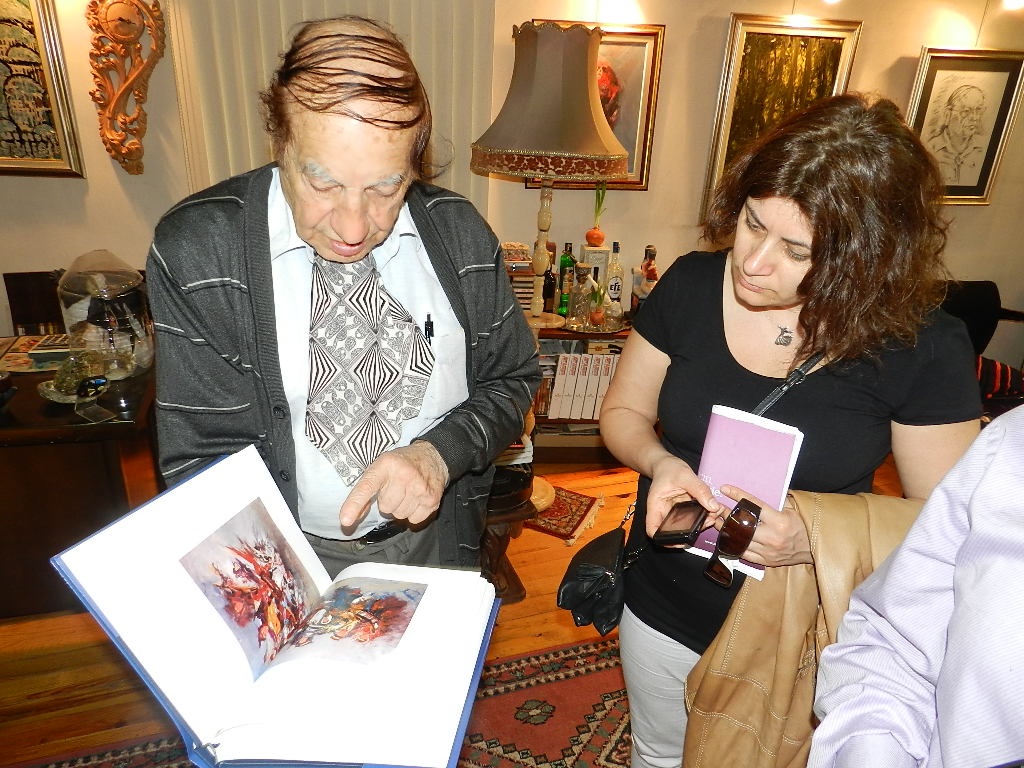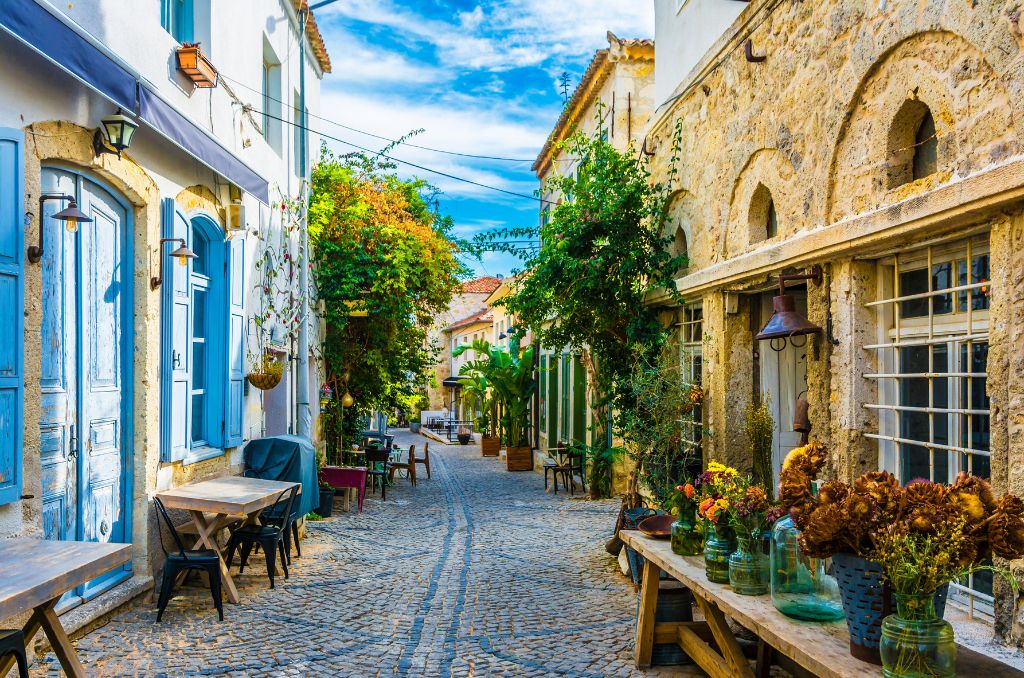
A thin line divides modernity and tradition at Istiklal Avenue, the most famous street in Istanbul’s European side in Turkey.
Roughly speaking, more than 3 million people visit the one mile street in a single day during weekends. But very few of them pass the line going from the modern space of the street filled with famous American-brand boutiques, art galleries, or nightclubs to Galata, a historic space located at the northern shore of Istanbuls’ Golden Horn.
I was trying to kill time when my mom, sister-in-law, cousin, and my brother browsing the expensive shops looking for good deals.
My 5-year-old sat comfortably in her blue stroller letting me do my exercise of the day. When we reached the border, we decided to go to Turkey’s historic past.
Turkish boy selling fruit juice
Only a few steps down, I could hear the beautiful, calming sound of Azan, the Muslim prayer calling. I always felt calm by hearing the magnificent sound of Azan, a sound I never heard in the U.S. I followed the sound and reached a small cozy blue mosque on the other side of the street. Men were getting ready to pray. It was Friday. I could see women entering their prayer area from a nearby gate. I paused and let my 5-year-old watch the crowd getting ready for prayer.
It was a hot day and I knew my 5-eary-old was getting restless. I saw a shop selling fresh fruit juice a few steps away. There was a big pile of pomegranate, grapefruit, orange, and grapes lying out voluptuously in front of the store.
 We passed the narrow stone carpet, one-way traffic street to the store. Forgetting that I must ask the price before I place an order in Istanbul. I ordered a cup of eight ounces of pomegranate juice from the boy, who looked 12 years old, behind the counter. He picked two large pomegranates, cut them in half, and playfully placed them in his extract machine. The cup was in my hand two minutes later.
We passed the narrow stone carpet, one-way traffic street to the store. Forgetting that I must ask the price before I place an order in Istanbul. I ordered a cup of eight ounces of pomegranate juice from the boy, who looked 12 years old, behind the counter. He picked two large pomegranates, cut them in half, and playfully placed them in his extract machine. The cup was in my hand two minutes later.
“How much,” I asked in Turkish. “25 lira,” the boy replied. “What,” I almost shouted in English. “15,” he replied in a whisper. “You just changed the price within less than a second,” I asked surprisingly.
Fifteen Turkish lira was about $7. The cup would normally cost $2.
By experience, I knew I must negotiate the price before placing an order. But I would never expect a 12-year-old boy, in the summer’s bright sunlight would lie to my face – a woman speaking his language. I was not doing a good job of speaking Turkish.
I only had 20 lira bills in my wallet. I handed one of my precious 20 liras, got back 5 and left the store. What was more painful– my kid didn’t want to drink the juice. It was sour in her taste.
Still trying to recover from my shopping experience, I was walking down the popular street when a beautiful green tiny mysterious alley attracted my attention. I let my 5-year-old leave her stroller and join me in walking. I stood at the entrance gate looking inside the alley, enjoying the view when my little one ran into the space. I ran after her to collect her.
A beautiful alley
While managing her toward the exit, I saw a naked statute at the end of the alley. The figure seemed so real. Her breasts and crotch were barely hidden with a light transparent red cloth. I was shocked. I didn’t expect to see a naked statute after hearing Azan just a few minutes ago.
 When I turned around to come down the alley, I saw a blue tall door. A pamphlet by the door grabbed my attention. It was written in English. A picture of an older man on the pamphlet reminded me of one of my old Jewish friend in Seattle. “Habib Gerez” was written above the picture.
When I turned around to come down the alley, I saw a blue tall door. A pamphlet by the door grabbed my attention. It was written in English. A picture of an older man on the pamphlet reminded me of one of my old Jewish friend in Seattle. “Habib Gerez” was written above the picture.
I collected my adughter and we came down the tiny mysterious tunnel.
Right by the alley, there was a spice souvenir shop. We went inside to buy presents for my American friends. I was browsing different boxes and gift sets when a tall, handsome gentlemen approached me. We started speaking in Turkish.
“How are you Madam?” he said. “I’m find, Thank you. How are you?” I asked. “How can I help you?” he asked. “I want to buy 10 boxes of yellow flower saffron. How much is each box?” I asked. “30 lira,” he said. “I’ll pay 5 lira for each box,” I said. “Oh, no no madam. I cannot sell them for 10 Lira. Impossible,” he said in English. “Well, I think you can, because I’m buying 10 of them,” I replied in English. “No Madam, I do not make any profit,” he said firmly.
“How come you speak English so well? Have you ever been in an English speaking country?” I asked. “Well, how about you,” he was flirting with me. “Yes,” I replied. “I studied philosophy in the U.S.” he said. “Which University,” I asked. “in the East Caost,” he replied. “But, I do not pay more than 5 lira for each of these,” I had learned my lessons from the 12 year old. “Oh, no madam. I cannot sell you this price,” he said.
“What is it Mustafa again,” a soft old masculine voice called to the man from my back in Turkish. “Are you flirting with an American again?”
I turned and saw a gentleman. His face was utterly familiar. I knew I have seen his face somewhere. I was staring at him. “How are you madam?” he said.
“You are Habib Gerez,” I said. I saw your picture at the door by your gallery.
“I never disappoint beautiful women,” he said.
Habib Gerez, a charming Jewish poet
I told our story about visiting his alley by accident. “I love to see your paintings,” I said. “OK, this way,” he headed toward the door. “What about yellow flower Saffron boxes madam?” the young philosopher asked. “I will be back Mustafa. And you are going to sell them to me for 5 lira,” I said and left the show with my little one.
We followed Habib Gerez to his cozy mysterious alley.
 Gerez took us back to the green narrow alley until we reached the tall blue door. There were four tall stairs in front of the door. He climbed them with no problem– a bit surprising considering his 88-year-old figure. He placed the key in its keyhole. Waiting for him to open the door, I stared at the pamphlet on the wall. Yes, it was him, the artist and the poet, fluent in five languages, the scripture read.
Gerez took us back to the green narrow alley until we reached the tall blue door. There were four tall stairs in front of the door. He climbed them with no problem– a bit surprising considering his 88-year-old figure. He placed the key in its keyhole. Waiting for him to open the door, I stared at the pamphlet on the wall. Yes, it was him, the artist and the poet, fluent in five languages, the scripture read.
Gerez opened the door and let us in. We entered a cozy, old-looking kitchen. Three wide stairs connected the kitchen to a spacious room on the right. A naked woman statue lie on the floor, and another naked woman made of a golden wood stood beside her.
“Too many naked women around you, Habib,” I said, referencing those sculptures inside and outside. “Tell me about them.”
“These are the works of my best friend Mustafa, a very famous sculptor in Turkey,” he replied.
My 5-year-old pulled my skirt. “I want to leave, moman,” she said. Everything was so antique, dusty, and quiet. My journalism curiosity was at its peak, I wanted to know more about his man and his naked statues. But before, I had to entertain her if I wanted to talk to Gerez. I asked her if she could watch a few episodes of Daniel Tiger Neighborhood, her favorite cartoon on PBS. “Yes,” she said excitedly.
I gently put her on a couch with her iPad and opened the downloaded episodes of the cartoon. Then, I grabbed my pen and notebook and turned around to follow the 88-year-old artist as he began to walk me around his three-level house.
A charming narcissist by nature, Gerez never failed to repeat his name more than one thousand times during our one-hour tour. Playful and self-assured, he showed me how he spent his time between his studio at the upper level, his writing office on the main floor, and the eating area at the corner of the house.
There were about 4000 paintings and books in his house. There were many copies of Gerez: Art Is My Destiny in his house. He wasn’t very successful in selling his last book, it seemed. He handed me the book, “Here, you can have this,” Gerez said. As you can see I have too many copies,” he said.
Unmarried with no children, Gerez owns four cars and he vacations in Italy and France. “I am not a wealthy man, you know,” he said. “But I know how to enjoy life.”
A Jewish attorney by training, he never practiced law seriously. Instead, he spent his time working as a reporter for different newspapers in Istanbul, including Haftamn Sesi, A Jewish-Turkish newspaper he cofounded in 1956. He wrote poems for Salom,Newspaper until 1997. Salom Newspaper loved his poems and paid him handsomely.
Gerez didn’t have an appetite to listen to anyone but himself. He loved to hear the sound of “Gerez,” echoed in a room. I found him overwhelmingly eccentric, very likable, and gentlemanly polite.
Even so, after all of those talks about “Gerez”, I knew so little about him. It was time to ask a personal question. “Have you ever been in love?” I asked him. He pretended he didn’t hear my question.
We went back to the same spacious room where my little one was watching her PBS cartoons on her iPad. Gerez sat behind his computer to open a link. He wanted to show me an interview he conducted for a TV show. “Everything is in English,” he said.
“Gerez, I know so much about your accomplishments,” I said. “But what about yourself? I asked you a question a minute ago, but you never answered,” I pressed. “Once I loved a woman I shouldn’t have,” he said. “Let’s leave it there.”
Rumor has it that when he was a young man, Gerez fell in love with a French woman married to his Turkish-Jewish friend. After that big chaotic love, he could never love any other woman.
“How do you like your life as a Jewish writer here?” I asked.
“I am a Turk,” he said, “only a Jewish one.”
I returned to the spice shop. Mustafa had already packed 12 boxes of yellow flower saffron, instead of ten. “10 lira,” he said. “Deal,” I said.
I got the boxes and left eh shop with my 5-year-old to go and find my party.
Please Pledge to Our Peace Journalism.
Goltune is editorially independent. We set our agenda. No one edits our editors. No one steers our opinion. This is important as it enables us to stay true to our values.
Every contribution we receive from readers like you, big or small, goes directly into funding our journalism. Please support Goltune, large or small.
Send your contributions to our PayPal account: [email protected]
Or, Click the link to pledge your support.
Thank you,
Goltune Editorial Team






